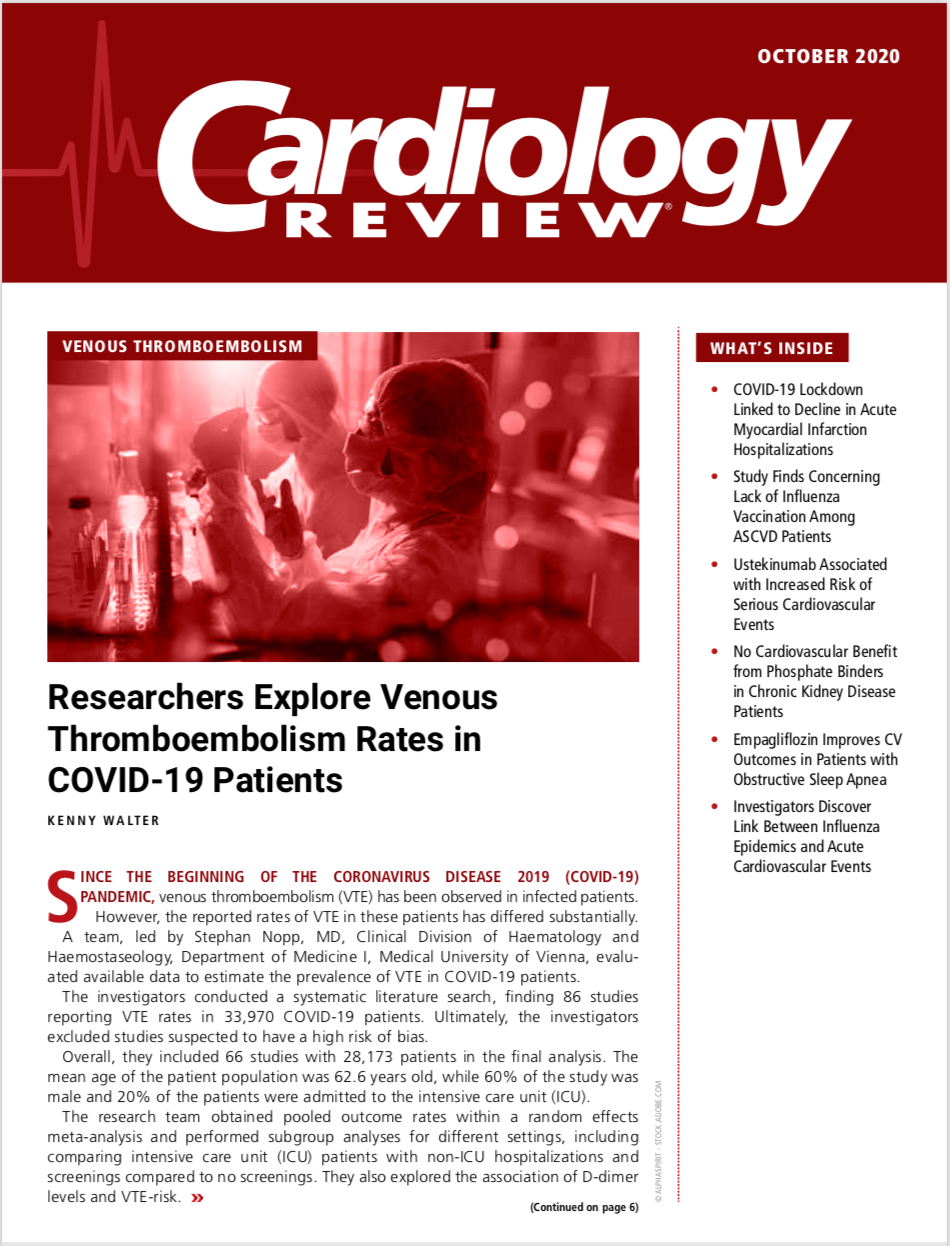Publication
Article
Cardiology Review® Online
Ustekinumab Associated with Increased Risk of Serious Cardiovascular Events
Author(s):
Ustekinumab should be prescribed cautiously to those at high cardiovascular risk.

The initiation of ustekinumab treatment is associated with an increased risk of acute coronary syndrome or stroke in patients with a high baseline cardiovascular risk, according to the findings of a recent study.
The results suggested ustekinumab should be prescribed with caution to patients at high cardiovascular risk.
Florence Poizeau, MD, and colleagues assessed whether the initiation of ustekinumab treatment was associated with an increased risk of severe cardiovascular events. They conducted the study using the French national health insurance database which covered 98% of the population living in France and included sociodemographic data and exhaustive data on all reimbursements for health-related expenditures, dispensed drugs with date of issue, any investigation, and hospitalization discharge codes. The team extracted data on all the individuals who had at least 1 reimbursement for ustekinumab between April 1, 2010 and December 31, 2016.
Poizeau and the investigators defined severe cardiovascular events as either acute coronary syndrome with hospitalization in the intensive care unit or ischemic stroke with hospitalization in any department, identified using the hospitalization discharge codes. Drug exposure was defined as the initiation of treatment with ustekinumab.
Overall, 98 patients who experienced severe cardiovascular events and were included in the main analysis. A majority of the patients were men (63%) with a median age of 57 years old and 78% were at high cardiovascular risk. Most patients (91%) had psoriasis, while 4% had Crohn disease and 2% had both.
Across the study population, the OR for the case-time control analysis was 2.41 (95% CI, .83-7.01). Among those at high cardiovascular risk, there was a significantly increased risk of a serious cardiovascular event in the first 6 months after ustekinumab initiation (OR, 4.17; 95% CI, 1.19-14.59). The risk was not observed among patients at low cardiovascular risk (OR, .3; 95% CI, .03-3.13).
The investigators conducted 2 sensitivity analyses. In the first, the team widened the definition of triggering circumstances by adding reinitiation and dose increase. The OR for a serious cardiovascular event was 3.41 (95% CI, 1.15-10.15). For those at high cardiovascular risk, the OR was 4.62 (95% CI, 1.36-15.61), while among low cardiovascular risk patients, the OR was 1 (95% CI, .08-12.56).
The second sensitivity analysis expanded the definition of serious cardiovascular events. The team added patients with unstable angina and those hospitalized in non-ICU wards with acute coronary syndrome. The OR for a serious cardiovascular event was 1.75 (95% CI, .86-3.56). Among patients with high cardiovascular risk, the OR was 3.2 (95% CI, 1.29-7.92). For low cardiovascular risk patients, the OR was .21 (95% CI, .02-1.69).
Based on the findings, the investigators noted a close collaboration between cardiologists and biologic prescribers could be beneficial to evaluate the risk of serious cardiovascular events for patients who receive ustekinumab.
The study, “Association Between Early Severe Cardiovascular Events and the Initiation of Treatment With the Anti-Interleukin 12/23p40 Antibody Ustekinumab,” was published online on JAMA Dermatology.






